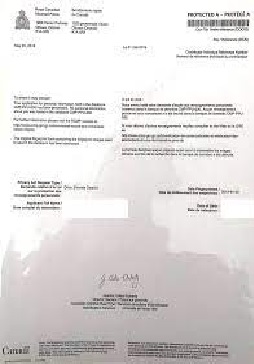Canada Police Certificate Application
Organisation : Government Of Canada
Facility Name : Apply For Canada Police Certificate
Country : Canada
Website : https://www.canada.ca/en/immigration-refugees-citizenship/services/application/medical-police/police-certificates/how/canada.html
| Want to comment on this post? Go to bottom of this page. |
|---|
How To Apply For Canada Police Certificate?
To Apply For Canada Police Certificate, the Procedure are given below
1. Police certificate and IRCC requirements
You don’t need to provide a police certificate when you apply for permanent residence in Canada. We’ll tell you if you need a Canadian criminal record check while your application is being processed.

Royal Canadian Mounted Police
Where do I get a criminal record check?
Police services:
**Using biographical information, such as your name and date of birth, police services search national police databases as well as their own local records when conducting criminal record checks.
**If required, police services may request fingerprints to confirm a person’s identity. Police agencies that do not provide fingerprinting services may refer applicants to an accredited fingerprinting company to be fingerprinted. The police agency or company then sends your fingerprints to the RCMP’s Canadian Criminal Real Time Identification Services (CCRTIS) for searches of the National Repository of Criminal Records.
2. Companies that perform name-based checks
Private companies that perform name-based checks do not have access to police databases. They enter into agreements with municipal police services to conduct name-based criminal record checks of the RCMP’s Canadian Police Information Centre (CPIC) system. This normally includes a check of the National Repository of Criminal Records based on the applicant’s name and date of birth and may include checks of other national databanks.
3. Accredited fingerprinting companies
Accredited fingerprinting companies are authorized to submit fingerprints to the RCMP’s Canadian Criminal Real Time Identification Services (CCRTIS) for searches of the National Repository of Criminal Records. The results of these certified criminal record checks do not include information from other national or local data bases.
Types of criminal background checks
A. Name-based criminal record checks
** Using names and dates of birth is the most common way to check a person’s criminal history.
** Name-based criminal record checks are done checking against the RCMP’s Canadian Police Information Centre (CPIC) system. They consist of a check of the National Repository of Criminal Records based on a person’s name and date of birth. It may also include searches of other national and local databases.
** Name-based checks have weaknesses in verifying a person’s identity due to some last names being the same, differences in spelling, use of nicknames, legal name changes and the intentional changing of names to avoid a record of criminal history.
B. Certified criminal record checks
** When name-based criminal record checks do not provide a definite way of confirming a person’s identity, you may be asked to provide fingerprints. This is known as a “certified criminal record check.”
** A fingerprint search of the National Repository of Criminal Records is conducted by RCMP’s Canadian Criminal Real Time Identification Services (CCRTIS).
** A very small number of people have fingerprints that cannot be processed electronically. In these exceptional cases, the police service will submit a paper copy of your fingerprints.
** The use of fingerprints for criminal record checks is based on informed consent and includes sharing the results of that information to a third party named by you on the application form.
** The fingerprints submitted to CCRTIS for criminal record checks are only used to confirm your identity. At no time are fingerprints added to a database where they could be subject to search.
i) Police information check
It is also known as a police certificate, background check, record check, or reference check. Contact your local police to learn more.
Vulnerable sector check:
**It is an offence to conduct a vulnerable sector check if the position does not meet the requirements of the Criminal Records Act.
**The hiring organization must make the request for a vulnerable sector check. The person being checked provides consent but does not make the request.
**There is no federal legislation that requires any organization to conduct vulnerable sector checks. Contact your provincial or territorial government for more information.
**Results of vulnerable sector checks are only made available to organizations located in Canada.
A vulnerable sector check is a police information check plus a check to see if a person has a record suspension (pardon) for sexual offences.
3. Process for getting a vulnerable sector check
** A description of the position
** The name of the organization staffing the position
** Details about the children or vulnerable persons (e.g. age, or other factors that can show how the person is vulnerable)
** If the position is volunteer, provide a letter from the organization stating the person will not be paid for services or any other personal expenses incurred.
Who conducts vulnerable sector checks:
Vulnerable sector checks must be conducted by the local Canadian police service where an applicant lives. In British Columbia, the British Columbia Criminal Records Review Program is the authorized body for conducting vulnerable sector checks.
Steps for getting a certified criminal record check
Step 1: Have your fingerprints taken
Step 2: Provide the following information to the person taking your fingerprints
It can include:
** Adoptions – Canadian and International
** Foreign travel – Visas, U.S. Waivers, Border Crossing
** Employment – specify the job title and the name of the employer (do not use abbreviations)
** Volunteer work – specify the job title and the name of the business/organization
** Applications for immigration to Canada
** – In the “Name and Address of Contributing Agency/Department” portion of the form, you must include the name and address of the Canadian Immigration Center, Embassy, Consulate or High Commission handling the case.
** Applications for Canadian Citizenship
** Applications to obtain criminal record to apply for a record suspension
** Name change
** Permanent residency in foreign countries (all countries except Canada)
** Requests under the Privacy Act (criminal record report will not contain the RCMP seal)
Optional: Verify the status of your application
Canadian Criminal Real Time Identification Services (CCRTIS) receives a high volume of requests and replies to them in the order they are received. Contact us only if your application has taken longer than the processing times indicated. Provide the following information:
**Your full name
**Your date of birth
**The date your application was submitted to CCRTIS
**Provide the reason for the criminal record check and specify if the application is for a vulnerable sector check
**A phone number where you can be reached on weekdays during the day
**The document control number (DCN), if available
Processing times and fees
If manual processing is involved and/or if there is a possible match to a criminal record:
**120 business days
**In some cases more time may be required due to the submission of incomplete information or in an effort to clarify parts of the application with local police. This process ensures the information that is released by CCRTIS is complete and accurate.
If there is NO match to a criminal record:
** 3 business days or less
** The results are mailed to the address provided and extra time should be allowed for delivery by Canada Post.
Processing fees
A certified criminal record check – also known as a fingerprint-based criminal record check – may require local and/or federal processing fees.
1. Local service fees
Local fees are determined by the local police agency or the accredited fingerprinting agency taking your fingerprints. Contact them directly if you would like more information about fees they charge. The fee charged by your local police is in addition to the federal fee.
2. Federal processing fees:
The federal processing fee is CDN$ 25 for each criminal record check, however, the federal fee is waived in some cases (see the table below). The federal fee is collected by the police service or accredited fingerprint company taking your fingerprints. The federal fee is in addition to fees charged by your local police or accredited company.

Why get a criminal record check?
Reasons for getting a criminal record check
**Organizations are responsible for determining their own unique requirements for hiring people. Many organizations require people to get criminal record or vulnerable sector checks for different reasons, some of which include employment, volunteer work, adoption, immigration or foreign travel, or name change.
**Because organizations are responsible for their screening procedures, they determine the type of check that is required. If you have questions about why an organization requires a criminal background check, you should consult with them directly.
Special Considerations
**Fingerprints must be submitted electronically to Canadian Criminal Real Time Identification Services (CCRTIS).
**Electronic fingerprint submissions to the RCMP are not currently available from outside of Canada. You must contact an accredited company within Canada that will digitize ink fingerprints and submit them electronically to the RCMP.
**Paper submissions will not be processed and will be sent back to you.
**If you need to submit fingerprints for a citizenship application, they must be collected inside Canada.
Rcmp Service Delays
There’s currently a large demand for RCMP criminal record checks. Your request may be delayed. If this delay has affected you, we’ll automatically extend the deadline to provide the criminal record check by 30 days. You don’t need to contact us or the RCMP to extend the deadline.